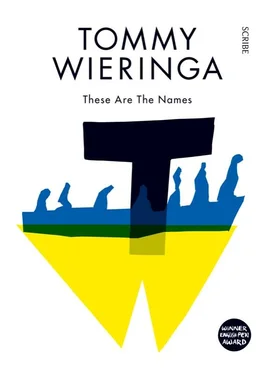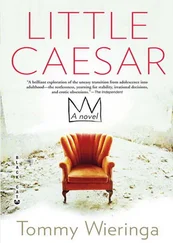After the pogroms came the camps. In Michailopol there had been a Lager. People spoke of one hundred thousand to two hundred thousand prisoners who had been executed there: mostly Jews, but also Red Army prisoners. In 1943, the Germans had started destroying the evidence: the mass graves were opened, and Sonderkommandos piled the bodies high and burned them. The fires burned for months. After the war, a Soviet report noted that the ground and substrate was saturated with the juice from corpses and melted human fat.
The girl put a hot plate on the table, and lit the tea-warmers inside it.
Little was left of the camp itself. It had become overgrown with trees and bushes. Years ago, a little monument had been set up beside what were once the gates to the Lager. Later, it was set on fire and plastered with swastikas. The brick walls still standing were daubed with the angled cross. In Michailopol there was no such thing as a respectful nod to the past.
The Chinese girl placed the platters of noodles and duck on the hot plate. Beg served himself, tilting the platter to let the bird and its juices slide onto his plate. He had arrived at the age when only sex and large quantities of food provided him with sensations of happiness. All the rest was extinguished; the heart was a motor that lost power with the years.
Still, undeniably, the discoveries about his past produced in him feelings that seemed like happiness; the right word for it, perhaps, was excitement, an edgy kind of anticipation. As though something was about to start — a sensation he remembered from childhood. The only thing was: he couldn’t for the life of him figure out what it was that was about to start. He was a Jew, that was all. It changed nothing and solved nothing. He would harbour no expectations. He would follow it, of course, but without assuming that it would add anything to his life.
It was a strategy the Chinese people behind the counter might have had something to say about, had they not made silence towards outsiders such a part of their nature. They lived behind a screen of enchanted silk, invisible and impenetrable.
In Michailopol’s crime statistics, they were almost entirely absent. He couldn’t remember a Chinese person ever having been arrested. If he went into the kitchen, of course, he would be sure to find a few people working without the proper documents, but there was no cause for him to check. They weren’t bothering anyone. Chinese people seemed to avoid even the most minor of public infractions.
If more ethnic groups did that, his work would be a lot easier. In fact, it would make him pretty much superfluous. He would show up at the scene of accidents, settle minor territorial disputes, and lead an existence otherwise as calm as that of a civil servant at the court of Lu, in the sixth century before Christ.
The curtain tinkled. The rabbi came in and walked to the counter without looking around. He placed his order. Beg ate his duck mechanically and watched him. The old man stood at the counter motionlessly until his meal came sliding through the little trapdoor. The Chinese man wrapped the containers in drab paper and dropped them into a plastic bag. Slowly, the rabbi counted out the change from his wallet.
As he was heading for the door, Beg raised his hand and said: ‘Mr. Eder.’
The rabbi looked up, roused from his thoughts. He came over to the table.
They spoke, the rabbi standing, his gaze fixed on the debris on Beg’s plate. Only then did Beg tell him about his mother’s candleholder. He heard himself talking. The bedroom, the glass cupboard, the veil. Then the rabbi said: ‘The menorah is hard for us to part with. It’s something … very important. Seven arms that draw us back to our origins.’
He looked at Beg’s plate again and said: ‘Your first meal as a Jew, and already you’re in violation.’
Beg looked at the remains in surprise.
‘Ham,’ the rabbi said. ‘Treife.’
Beg didn’t understand.
‘Not kosher,’ the rabbi said.
There were strips of pink ham between the noodles; Beg hadn’t noticed them.
The rabbi looked despondently at his own plastic bag of food. ‘But, oh well …?’
He was almost to the door when Beg stood up and said: ‘One more thing, one more question.’
Zalman Eder came back, his movements impatient.
‘I was wondering,’ Beg said, ‘what if all those things are a mistake? The directives. All happenstance, what then?’
A sly smile appeared on the rabbi’s lips. He said: ‘Let me ask you this: in a city there are ten butchers, nine of them kosher. Then, on the street, you find a package of meat. Nice meat; you’re glad you found it. But is it kosher, or isn’t it? You go to the rabbi for counsel. How great is the chance, do you think, that it’s kosher?’
‘Nine out of ten,’ Beg said.
‘The chance that it’s kosher, I would say, is so great that you can eat it with a clear conscience.’
‘And what if it’s not kosher?’
The rabbi laughed. ‘Then we pretend it is! And anyone who tries to prove differently had better be pretty damned sharp.’
The Chinese laughed quietly along with them, behind their counter, without understanding a word.
CHAPTER TWENTY.Then there were six
The boy crawled out from under the tarp. He stared into a day of ground fog and water — nothing but gusts of rain and a train of clouds as far as you could see. His travelling companions lay scattered around him in dark clumps, unrecognisable in their night-time shrouds of plastic sheeting and old coats. The man from Ashkhabad and the woman lay furthest from the rest. The boy looked in the direction they would take later, at the flat band of earth, the monotonous view, as though this journey began anew each day, the eternal return of the same. The steppe was a repetition, a dull-wittedly looping melody; it ground them down and wore them out, took another little piece of them every day, and would finally pulverise them all. Sometimes he thought about going on alone, about trying his luck without the others — how much of a chance was there that he would be the only one to reach the far side? And how much of a chance was there that they would arrive without him?
Had he learned enough from them to establish his bearings? Could he imitate the poacher’s techniques? Did he know where to dig to find edible tubers? He needed to pay more attention, so that he, too, could survive on his own, someday.
Once, long ago, they would have been on their feet before sunrise. They had been conquerors back then; these days, wild horses couldn’t drag them from their beds. They abandoned their dreams with a curse. They scratched at their fleabites and rubbed their eyes. Never did they seem more lost than when they arose and the dispiriting flats rolled out before them.
They packed up their sleeping gear, tossed the bundles over their shoulders, and entered the new day. The wet grass of the steppe soaked their trouser legs. No one said a word. The gaping sole of the boy’s right shoe scooped sand. They spread out and moved through the tall, dead grass.
The boy looked back. Africa and the tall man were missing. ‘Hey!’ he shouted to the others, then ran back to the campsite. His shoe flapped. It made him dizzy, but he kept running.
Foreboding.
The black man was kneeling beside the tall man’s sleeping space. The plastic had been thrown back. The tall man’s mouth had fallen open, as though he’d choked on a word he would never pronounce again. His beer-yellow eyes were riveted on the sky above, drops of rain trickling through the grey hairs of his beard.
The black man was murmuring a prayer with his eyes closed. In his hand he held the cross that hung on a cord around his neck. The boy began pulling away the plastic at the tall man’s feet, cautiously, ready to leap aside. The trouser legs were pulled up a bit, and he saw his skinny blue shins, bitten to pieces by fleas. The others were coming; he had to work fast. They were filthy old gym shoes and they stank like the plague, but they were still whole. He had the left one already, but it was the right one he needed most urgently. The shoe wouldn’t budge; it was lashed tightly to the foot. The boy was in too much of a hurry to untie the laces, so he pulled hard on the heel. The tall man’s body shook beneath his efforts.
Читать дальше











